Cx – Love Does Not Envy 13: 4c
Love Does Not Envy
13: 4c

Here is the first of eight negative descriptions of love. Love does not envy (Greek: zeloi, meaning to be jealous). Love and envy are mutually exclusive. Shakespeare called jealousy “the green sickness” and Yeshua referred to it as an evil eye (Matthew 20:15 NKJV). Jealousy, or envy, has two forms. One form says, “I want what someone else has.” If they have a better car than we do, we want it. If they are praised for something they do, we want some or more for ourselves. That sort of jealousy is bad enough. However, a worse kind says, “I wish they didn’t have what they have” (Matthew 20:1-16). The second kind of jealousy is more than selfish; it is desiring evil for someone else. It is jealousy on the deepest, most corrupt, and destructive level. This is the jealousy Solomon uncovered in the woman who pretended to be a child’s mother. When her own infant died, she secretly exchanged him for the baby of a friend who was staying with her. The true mother discovered what had happened and, when their dispute was taken before the king, he ordered the baby cut in half, a half to be given to each woman. The true mother pleaded for the baby to be spared, even if it meant losing possession of him. The false mother, however, would rather have had the baby killed than for the true mother to have him (see the commentary on The Life of Solomon, to see link click At – A Wise Ruling).
Fury is cruel and anger overwhelming, but who can stand up to jealousy (Proverbs 27:4)? In its extreme, jealousy has a viciousness shared with no other sin. If you have bitter jealousy and selfish ambition in your heart, says James, do not be arrogant and so lie against the truth. This wisdom is not that which comes down from above, but is earthly, natural, demonic. For where jealousy and selfish ambition exist, there is disorder and every evil thing (James 3:14-16). Selfish ambition, which is fueled by jealousy, is often “successful.” But its wisdom is demonic and its worldly “success” is ultimately destructive.
Jealousy is not a moderate or harmless sin. It was Eve’s jealousy of God, sparked by her pride, to which Satan successfully appealed. She wanted to be like God, to have what He has and to know what He knows. Jealousy was an integral part of that first great sin, from which all other sin has descended. The next sin mentioned in Genesis is murder, caused by Cain’s sin of jealousy of his brother Abel (see the commentary on Genesis Bj – Your Brother’s Blood Cries Out to Me from the Ground). Joseph’s brothers sold him into slavery because of jealousy (see the commentary on Genesis Jb – Joseph’s Brothers Sold Him for Twenty Shekels of Silver). Dani’el was thrown into the lion’s den because of the jealousy of his fellow officials in Babylon. Jealousy causes the elder brother to resent the father’s attention to the prodigal son (see the commentary on The Life of Christ Hu – The Parable of the Lost Son and His Jealous Brother). And there are many other similar biblical illustrations.
One of the hardest battles a believer must fight is against jealousy. There is always someone who is a little better. But, love never detracts from the praise that is due to another, nor tries to make him seem less and self seem more by comparison. The practice of the world is quite the opposite. The negatives used in Paul’s description suggest corresponding positives. Instead of being envious, love is satisfied with its own portion and glad for others’ success.404 Envy was behind much of the party strife in the Corinthian church, Paul says as much (see Ar – The Immaturity of the Worldly Believer).
In sharp contrast to the many accounts of jealousy in the Corinthian church is the account of Jonathan’s agape love for David, who was not only greater and more popular than Jonathan, but was a threat to the throne that Jonathan normally would have inherited. Yet we are told of nothing by Jonathan’s great respect and love for his friend David, for whom he would willingly have sacrificed not only the throne but himself, he loved David as he loved his own life (First Samuel 20:17). Jonathan’s father, King Sha’ul, lost his throne and his blessing because of his jealousy, primarily of David (see the commentary on the Life of David Ao – Sha’ul’s Jealousy of David). Jonathan willingly gave up the throne and received a greater blessing because he would have nothing to do with jealousy.
Dear Heavenly Father, What a wonderful Father You are! Thank You for all the godly accounts of people in Your Word, people like Jonathan, who showed true love to his friend. Jonathan’s willingness to give up his hereditary right to being Israel’s king, so his friend could be king, shows a deep love that is so much more than mere words but is from the heart. That unselfish attitude helps us to understand how to live in a way that pleases You, even in hard and unfair situations. Having Your love and presence is such a great peace and comfort. What joy knowing that not only did You love us in the past and sent Your Son as our Redeemer (Second Corinthians 5:21), You love us now and will love us thru all eternity! When we live with the goal to please You in all we do and say, we do not need to get upset when discouragement comes our way. Living for Your approval is what counts for all eternity. We have an audience of One! It is refreshing to be able to put any bitter, unfair situation in Your hands, to turn from envy to Your loving arms. It is a joy to live following Your example of love. In Your Holy Son’s name and power of His resurrection. Amen
When love sees someone who is popular, successful, beautiful, or talented, it is glad for them and never jealous or envious. Eliezer of Damascus was the heir to Abram’s estate because he had no son (Genesis 15:2). When Isaac was born, however, and Eliezer lost the privileged inheritance, his love for Abram and Isaac never wavered (see the commentary on Genesis Fx – Go to My Country and My Own Relatives and Get a Wife for My Son Isaac). A loving person is never jealous, but is always glad for the success of others.405



 Paired with the more passive side of love (love is patient), is a corresponding active side: love is kind. Paul does not describe love to us in the role of performing great, wonderful, and astounding deeds; he prefers to show us how the inner heart of love looks when it is placed among worldly people and weak believers. He does not picture love in ideal surroundings of friendship and affection where each individual embraces and kisses the other, but in the rough and tuff surroundings of a sinful world and faulty believers, where the stresses of life bring out the positive power and value of love.401
Paired with the more passive side of love (love is patient), is a corresponding active side: love is kind. Paul does not describe love to us in the role of performing great, wonderful, and astounding deeds; he prefers to show us how the inner heart of love looks when it is placed among worldly people and weak believers. He does not picture love in ideal surroundings of friendship and affection where each individual embraces and kisses the other, but in the rough and tuff surroundings of a sinful world and faulty believers, where the stresses of life bring out the positive power and value of love.401

 இணைப்புகள் மற்றும் ஆதாரங்கள் பற்றிய கூடுதல் தகவலைப் பார்க்கவும்.
இணைப்புகள் மற்றும் ஆதாரங்கள் பற்றிய கூடுதல் தகவலைப் பார்க்கவும். ஒரு நாள் தனியாக இருந்தபோது, கேப்ரியல் தேவதை அவளைச் சந்தித்தார், அவர் அவளிடம் சென்று கூறினார்: வணக்கம், நீங்கள் மிகவும் விரும்பப்படுகிறீர்களே! மிரியம் அருளைப் பெறுவதாக விவரிக்கப்படுகிறது, அருளை அளிக்கும் சக்தியைக் கொண்டிருக்கவில்லை. இந்த பாக்கியத்திற்கு தகுதியான வாழ்க்கையின் ஒரு குறிப்பிட்ட புனிதத்தை அவள் பெற்றிருந்ததால் அவள் இந்த பணிக்கு தேர்ந்தெடுக்கப்படவில்லை. காபிரியேலின் வார்த்தைகள் மரியாவின் பங்கில் எந்த சிறப்பு தகுதியும் இல்லை என்று கூறுகிறது. 53 கர்த்தர் உன்னுடன் இருக்கிறார் (லூக்கா 1:28). அந்த வார்த்தைகளால் மிரியம் தன் நற்பெயரையும் கனவுகளையும் இழந்தாள். அவள் வாழ்நாள் முழுவதும் யூத சமூகத்தில் இருந்து ஒதுக்கப்பட்டிருப்பதற்கான உண்மையான வாய்ப்பு இருந்தது. குறைந்த பட்சம், அவர் தனது கணவரின் நம்பிக்கையை இழந்தார். அவளுடைய பெற்றோரைப் பற்றி என்ன? அதிசயமான பாலினமற்ற கர்ப்பம் பற்றிய அவளுடைய அபத்தமான கதையை அவர்கள் நம்பினார்களா? அவளுடைய குடும்பம் இதுபோன்ற ஒரு மூர்க்கத்தனமான கதையில் விழுந்தது சாத்தியமில்லை. கடவுளின் நோக்கங்களைத் தழுவுவதற்கான மேரியின் முடிவு, சிரமங்களின் பனிச்சரிவைக் கட்டவிழ்த்துவிட்டு, மூச்சடைக்கக்கூடிய பாக்கியம் மற்றும் சொல்ல முடியாத வலி ஆகியவற்றின் குழப்பமான கலவையில் அவளை இழுத்தது.54 முக்கியத்துவம் வாய்ந்த வாழ்க்கையானது, செலவைப் பொருட்படுத்தாமல் ADONAIயின் விருப்பத்திற்குச் சரணடைய ஆர்வமுள்ள இதயத்தால் பெரும்பாலும் முந்தியது என்பதை நினைவூட்டுகிறோம்.
ஒரு நாள் தனியாக இருந்தபோது, கேப்ரியல் தேவதை அவளைச் சந்தித்தார், அவர் அவளிடம் சென்று கூறினார்: வணக்கம், நீங்கள் மிகவும் விரும்பப்படுகிறீர்களே! மிரியம் அருளைப் பெறுவதாக விவரிக்கப்படுகிறது, அருளை அளிக்கும் சக்தியைக் கொண்டிருக்கவில்லை. இந்த பாக்கியத்திற்கு தகுதியான வாழ்க்கையின் ஒரு குறிப்பிட்ட புனிதத்தை அவள் பெற்றிருந்ததால் அவள் இந்த பணிக்கு தேர்ந்தெடுக்கப்படவில்லை. காபிரியேலின் வார்த்தைகள் மரியாவின் பங்கில் எந்த சிறப்பு தகுதியும் இல்லை என்று கூறுகிறது. 53 கர்த்தர் உன்னுடன் இருக்கிறார் (லூக்கா 1:28). அந்த வார்த்தைகளால் மிரியம் தன் நற்பெயரையும் கனவுகளையும் இழந்தாள். அவள் வாழ்நாள் முழுவதும் யூத சமூகத்தில் இருந்து ஒதுக்கப்பட்டிருப்பதற்கான உண்மையான வாய்ப்பு இருந்தது. குறைந்த பட்சம், அவர் தனது கணவரின் நம்பிக்கையை இழந்தார். அவளுடைய பெற்றோரைப் பற்றி என்ன? அதிசயமான பாலினமற்ற கர்ப்பம் பற்றிய அவளுடைய அபத்தமான கதையை அவர்கள் நம்பினார்களா? அவளுடைய குடும்பம் இதுபோன்ற ஒரு மூர்க்கத்தனமான கதையில் விழுந்தது சாத்தியமில்லை. கடவுளின் நோக்கங்களைத் தழுவுவதற்கான மேரியின் முடிவு, சிரமங்களின் பனிச்சரிவைக் கட்டவிழ்த்துவிட்டு, மூச்சடைக்கக்கூடிய பாக்கியம் மற்றும் சொல்ல முடியாத வலி ஆகியவற்றின் குழப்பமான கலவையில் அவளை இழுத்தது.54 முக்கியத்துவம் வாய்ந்த வாழ்க்கையானது, செலவைப் பொருட்படுத்தாமல் ADONAIயின் விருப்பத்திற்குச் சரணடைய ஆர்வமுள்ள இதயத்தால் பெரும்பாலும் முந்தியது என்பதை நினைவூட்டுகிறோம்.









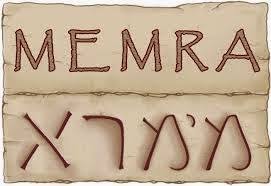



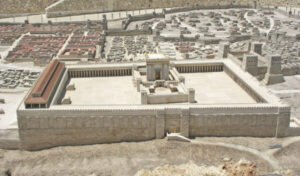
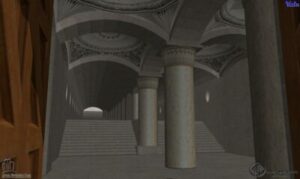
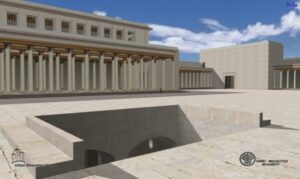 यह एक तीन एकड़ का मंच था जिसकी दीवारें एक चौथाई मील तक फैली हुई थीं और इसमें रोमन कोलिज़ीयम के आकार के दो एम्फीथिएटर हो सकते थे। पाँच सौ हाथ वर्ग होने के कारण, इसमें कुल लगभग २००,००० लोग बैठ सकते थे। उन्होंने खुद को एक बहुत बड़े भीड़-भाड़ वाले प्लाज़ा पर खड़ा पाया, जहाँ वे अपने बेटे के संकेतों के लिए कई उपासकों को स्कैन करना शुरू करते हैं। यह जानना असंभव लग रहा था कि पहले कहाँ देखना है। उन्हें आगे क्या करना चाहिए? उन्हें कहाँ जाना चाहिए?
यह एक तीन एकड़ का मंच था जिसकी दीवारें एक चौथाई मील तक फैली हुई थीं और इसमें रोमन कोलिज़ीयम के आकार के दो एम्फीथिएटर हो सकते थे। पाँच सौ हाथ वर्ग होने के कारण, इसमें कुल लगभग २००,००० लोग बैठ सकते थे। उन्होंने खुद को एक बहुत बड़े भीड़-भाड़ वाले प्लाज़ा पर खड़ा पाया, जहाँ वे अपने बेटे के संकेतों के लिए कई उपासकों को स्कैन करना शुरू करते हैं। यह जानना असंभव लग रहा था कि पहले कहाँ देखना है। उन्हें आगे क्या करना चाहिए? उन्हें कहाँ जाना चाहिए?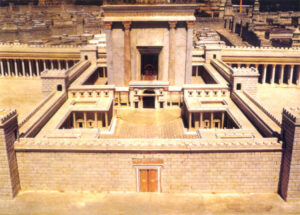 अभयारण्य की ओर बढ़ते हुए, वे सुंदर द्वार से गुजरे और महिलाओं के दरबार में प्रवेश किया। मंदिर परिसर का यह भीतरी क्षेत्र पुरुषों और महिलाओं दोनों के लिए खुला था। निश्चित रूप से, यह सभी के लिए पूजा का सामान्य स्थान था और कुछ हद तक खुली हवा में मंदिर के आराधनालय के रूप में कार्य करता था। यह एक बड़ा क्षेत्र था जो ७० ७०.८७ गुणा ७०.८७ मीटर, ५,०२३ वर्ग मीटर, या १६,४७५ वर्ग फीट में फैला था। इसके चारों ओर ६० फीट वर्ग का एक साधारण बरामदा था। कुछ ही दिन पहले फसह की ऊंचाई पर यह ६००० उपासकों को धारण करने में सक्षम था। लेकिन अब तथाकथित आधी छुट्टियों के कारण कई तीर्थयात्री घर लौट चुके थे। हालाँकि, यह अभी भी काफी भीड़भाड़ वाला था, कि उन्हें इस निष्कर्ष पर पहुँचने में जितना समय लगा था, उससे अधिक समय लगा कि यीशु कहीं नहीं था।
अभयारण्य की ओर बढ़ते हुए, वे सुंदर द्वार से गुजरे और महिलाओं के दरबार में प्रवेश किया। मंदिर परिसर का यह भीतरी क्षेत्र पुरुषों और महिलाओं दोनों के लिए खुला था। निश्चित रूप से, यह सभी के लिए पूजा का सामान्य स्थान था और कुछ हद तक खुली हवा में मंदिर के आराधनालय के रूप में कार्य करता था। यह एक बड़ा क्षेत्र था जो ७० ७०.८७ गुणा ७०.८७ मीटर, ५,०२३ वर्ग मीटर, या १६,४७५ वर्ग फीट में फैला था। इसके चारों ओर ६० फीट वर्ग का एक साधारण बरामदा था। कुछ ही दिन पहले फसह की ऊंचाई पर यह ६००० उपासकों को धारण करने में सक्षम था। लेकिन अब तथाकथित आधी छुट्टियों के कारण कई तीर्थयात्री घर लौट चुके थे। हालाँकि, यह अभी भी काफी भीड़भाड़ वाला था, कि उन्हें इस निष्कर्ष पर पहुँचने में जितना समय लगा था, उससे अधिक समय लगा कि यीशु कहीं नहीं था।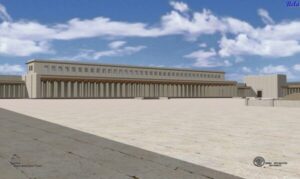 अंत में, अंतिम उपाय के रूप में, वे रॉयल स्टोआ गए (देखें
अंत में, अंतिम उपाय के रूप में, वे रॉयल स्टोआ गए (देखें 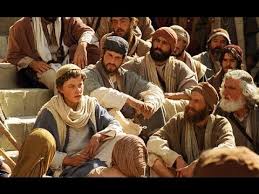 शाही स्टोआ में बैठे जहां महासभा के कुछ सदस्यों ने फसह के दौरान तीर्थ यात्रियों को पढ़ाया, मेरी ने उनकी आवाज सुनी। तीन दिनों की उन्मत्त खोज के बाद, उन्होंने उसे सुरक्षित और स्वस्थ पाया; शांति से डब्बियों को सुनना और उनसे प्रश्न पूछना, ऐसा प्रतीत होता है, अपने माता-पिता के संकट के बारे में बेफिक्र। जब उन्होंने उसे देखा, तो वे चकित हुए क्योंकि उसके मुंह से आने वाले शब्द कुछ भी नहीं थे जैसा उन्होंने पहले कभी सुना था (लूका २:४८क)। मेरी और योसेफ उस सहजता से हैरान थे जिसके साथ उनके बेटे ने अदोनाइ की बातों पर चर्चा की।
शाही स्टोआ में बैठे जहां महासभा के कुछ सदस्यों ने फसह के दौरान तीर्थ यात्रियों को पढ़ाया, मेरी ने उनकी आवाज सुनी। तीन दिनों की उन्मत्त खोज के बाद, उन्होंने उसे सुरक्षित और स्वस्थ पाया; शांति से डब्बियों को सुनना और उनसे प्रश्न पूछना, ऐसा प्रतीत होता है, अपने माता-पिता के संकट के बारे में बेफिक्र। जब उन्होंने उसे देखा, तो वे चकित हुए क्योंकि उसके मुंह से आने वाले शब्द कुछ भी नहीं थे जैसा उन्होंने पहले कभी सुना था (लूका २:४८क)। मेरी और योसेफ उस सहजता से हैरान थे जिसके साथ उनके बेटे ने अदोनाइ की बातों पर चर्चा की।